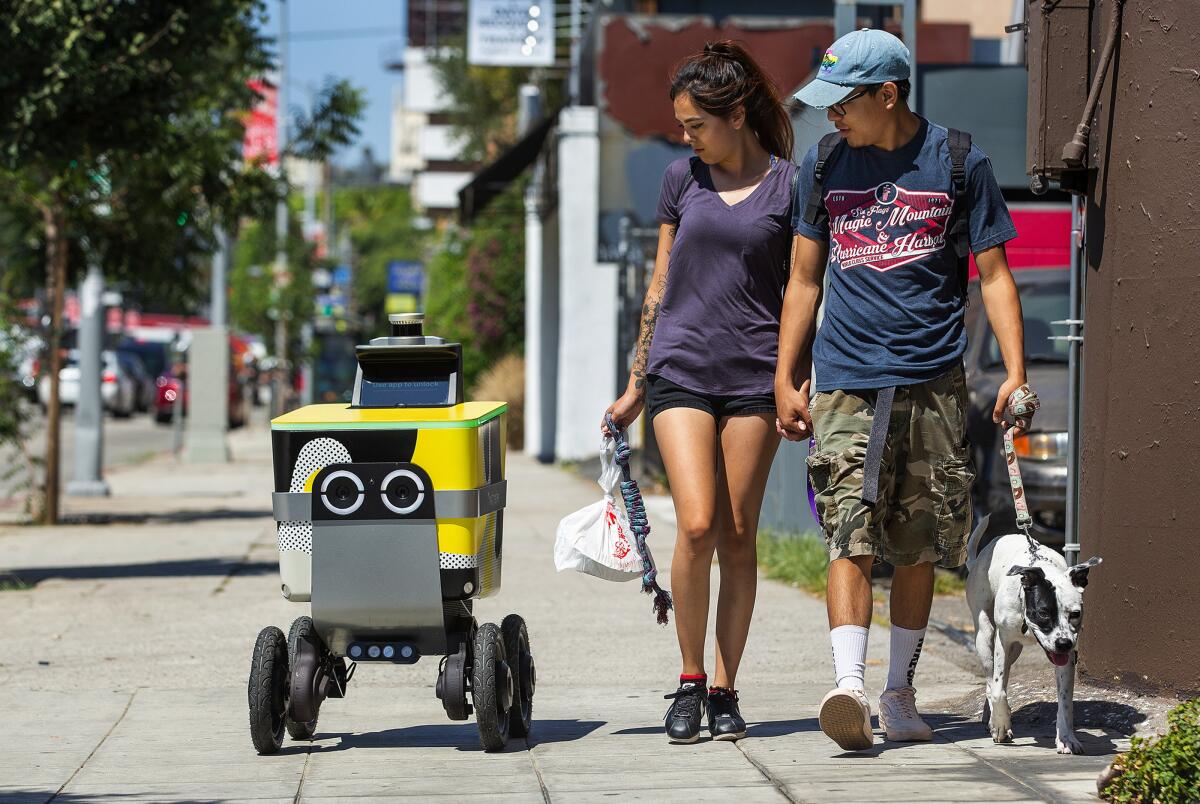Testing tech ideas in public? San Francisco says get a permit

- Share via
Tired of San Francisco streets being used as a testing ground for the latest delivery technology and transportation apps, city leaders are now requiring businesses to get permits before trying out new high-tech ideas in public.
Supporters of the legislation, which the Board of Supervisors unanimously approved Tuesday, say it is the first of its kind in the U.S. They say it’s long overdue in a city that’s a hub for major tech companies but is more accustomed to reacting to the sudden arrival of new technology — like hundreds of dockless electric scooters that appeared overnight last year.
The tech industry has showered San Francisco with high-paying jobs and cemented its reputation as a place for big ideas, but the success of home-grown companies Airbnb, Lyft and Uber has vexed some residents as streets have become more congested and the housing shortage has worsened.
“I support innovation and technology, but our residents are not guinea pigs, and our public infrastructure is not a free-for-all,” said Norman Yee, president of the Board of Supervisors who introduced the legislation.
The Office of Emerging Technology will serve as a one-stop shop for entrepreneurs who want to test their products in San Francisco’s public space. Companies will not be allowed to experiment unless the office declares the tech in question a “net public good.”
It’s not clear how proposals will be evaluated, but companies that share data, ensure public safety and privacy when testing, and promote job creation would fare better than those that don’t.
The office will have oversight over new technology launched on, above or below city property or on public right-of-ways. Yee said hoverboards, delivery drones and data-gathering devices on sidewalks or other public infrastructure would be subject to regulation.
Local officials have a duty to protect public infrastructure and to send the message that public space is “not the Wild West” for anyone with coding skills and a neat idea, said Aaron Klein, a fellow in economic studies at the Brookings Institution, a public policy think tank.
“On the other hand, too much local control and too many hoops to jump through can be easily manipulated by vested interests to fight advancement,” he said.
San Francisco political strategist Jon Golinger says it’s time that City Hall took control after nearly a decade of political leaders allowing businesses free rein. The lenience made some people wealthy but didn’t provide enough public good to a city with skyrocketing housing prices, growing homelessness and widening income inequality.
“It had a detrimental and lasting effect on the quality of life and the health of our city,” he said.
The Silicon Valley Leadership Group, founded by David Packard of Hewlett-Packard, objects to the permitting requirement, saying it would stifle innovation and burden business.
But the legislation has the backing of sf.citi, a tech association founded by angel investor Ron Conway, a longtime nemesis of advocates of stricter regulation.
“We believe that the supervisor’s approach of working with — rather than against — industry to build legislation is the kind of leadership this city needs to be successful,” said Jennifer Stojkovic, sf.citi’s executive director.
More to Read
Inside the business of entertainment
The Wide Shot brings you news, analysis and insights on everything from streaming wars to production — and what it all means for the future.
You may occasionally receive promotional content from the Los Angeles Times.










